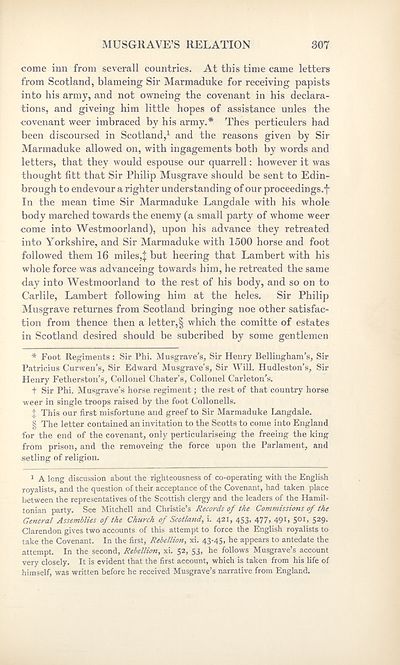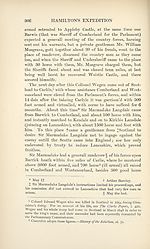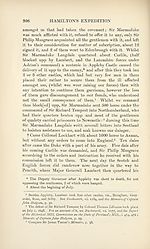Series 1 > Miscellany of the Scottish History Society (Second volume)
(332) Page 307
Download files
Complete book:
Individual page:
Thumbnail gallery: Grid view | List view

MUSGRAVE’S RELATION
307
come inn from severall countries. At this time came letters
from Scotland, blameing Sir Marmaduke for receiving papists
into his army, and not owneing the covenant in his declara¬
tions, and giveing him little hopes of assistance unles the
covenant weer imbraced by his army.* Thes perticulers had
been discoursed in Scotland,1 and the reasons given by Sir
Marmaduke allowed on, with ingagements both by words and
letters, that they would espouse our quarrell: however it was
thought fitt that Sir Philip Musgrave should be sent to Edin-
brough to endevour a righter understanding of our proceedings.f
In the mean time Sir Marmaduke Langdale with his whole
body marched towards the enemy (a small party of whome weer
come into Westmoorland), upon his advance they retreated
into Yorkshire, and Sir Marmaduke with 1500 horse and foot
followed them 16 miles4 but heering that Lambert with his
whole force was advanceing towards him, he retreated the same
day into Westmoorland to the rest of his body, and so on to
Garble, Lambert following him at the heles. Sir Philip
Musgrave returnes from Scotland bringing noe other satisfac¬
tion from thence then a letter,§ which the comitte of estates
in Scotland desired should be subcribed by some gentlemen
* Foot Regiments : Sir Phi. Musgrave’s, Sir Henry Bellingham’s, Sir
Patricias Curweu’s, Sir Edward Musgrave’s, Sir Will. Hudleston’s, Sir
Henry Fetherston’s, Collonel Chater’s, Collonel Carleton’s.
t Sir Phi. Musgrave’s horse regiment; the rest of that country horse
weer in single troops raised by the foot Collonells.
J This our first misfortune and greef to Sir Marmaduke Langdale.
§ The letter contained an invitation to the Scotts to come into England
for the end of the covenant, only perticulariseing the freeing the king
from prison, and the removeing the force upon the Parlament, and
setling of religion.
1 A long discussion about the righteousness of co-operating with the English
royalists, and the question of their acceptance of the Covenant, had taken place
between the representatives of the Scottish clergy and the leaders of the Hamil¬
tonian party. See Mitchell and Christie’s Records of the Commissions of the
General Assemblies of the Church of Scotland, i. 421, 453, 477, 491, 501, 529.
Clarendon gives two accounts of this attempt to force the English royalists to
take the Covenant. In the first, Rebellion, xi. 43-45. he appears to antedate the
attempt. In the second, Rebellion, xi. 52, 53, he follows Musgrave’s account
very closely. It is evident that the first account, which is taken from his life of
himself, was written before he received Musgrave’s narrative from England.
307
come inn from severall countries. At this time came letters
from Scotland, blameing Sir Marmaduke for receiving papists
into his army, and not owneing the covenant in his declara¬
tions, and giveing him little hopes of assistance unles the
covenant weer imbraced by his army.* Thes perticulers had
been discoursed in Scotland,1 and the reasons given by Sir
Marmaduke allowed on, with ingagements both by words and
letters, that they would espouse our quarrell: however it was
thought fitt that Sir Philip Musgrave should be sent to Edin-
brough to endevour a righter understanding of our proceedings.f
In the mean time Sir Marmaduke Langdale with his whole
body marched towards the enemy (a small party of whome weer
come into Westmoorland), upon his advance they retreated
into Yorkshire, and Sir Marmaduke with 1500 horse and foot
followed them 16 miles4 but heering that Lambert with his
whole force was advanceing towards him, he retreated the same
day into Westmoorland to the rest of his body, and so on to
Garble, Lambert following him at the heles. Sir Philip
Musgrave returnes from Scotland bringing noe other satisfac¬
tion from thence then a letter,§ which the comitte of estates
in Scotland desired should be subcribed by some gentlemen
* Foot Regiments : Sir Phi. Musgrave’s, Sir Henry Bellingham’s, Sir
Patricias Curweu’s, Sir Edward Musgrave’s, Sir Will. Hudleston’s, Sir
Henry Fetherston’s, Collonel Chater’s, Collonel Carleton’s.
t Sir Phi. Musgrave’s horse regiment; the rest of that country horse
weer in single troops raised by the foot Collonells.
J This our first misfortune and greef to Sir Marmaduke Langdale.
§ The letter contained an invitation to the Scotts to come into England
for the end of the covenant, only perticulariseing the freeing the king
from prison, and the removeing the force upon the Parlament, and
setling of religion.
1 A long discussion about the righteousness of co-operating with the English
royalists, and the question of their acceptance of the Covenant, had taken place
between the representatives of the Scottish clergy and the leaders of the Hamil¬
tonian party. See Mitchell and Christie’s Records of the Commissions of the
General Assemblies of the Church of Scotland, i. 421, 453, 477, 491, 501, 529.
Clarendon gives two accounts of this attempt to force the English royalists to
take the Covenant. In the first, Rebellion, xi. 43-45. he appears to antedate the
attempt. In the second, Rebellion, xi. 52, 53, he follows Musgrave’s account
very closely. It is evident that the first account, which is taken from his life of
himself, was written before he received Musgrave’s narrative from England.
Set display mode to:
![]() Universal Viewer |
Universal Viewer | ![]() Mirador |
Large image | Transcription
Mirador |
Large image | Transcription
Images and transcriptions on this page, including medium image downloads, may be used under the Creative Commons Attribution 4.0 International Licence unless otherwise stated. ![]()
| Scottish History Society volumes > Series 1 > Miscellany of the Scottish History Society (Second volume) > (332) Page 307 |
|---|
| Permanent URL | https://digital.nls.uk/126950972 |
|---|
| Attribution and copyright: |
|
|---|
| Description | Over 180 volumes, published by the Scottish History Society, containing original sources on Scotland's history and people. With a wide range of subjects, the books collectively cover all periods from the 12th to 20th centuries, and reflect changing trends in Scottish history. Sources are accompanied by scholarly interpretation, references and bibliographies. Volumes are usually published annually, and more digitised volumes will be added as they become available. |
|---|


